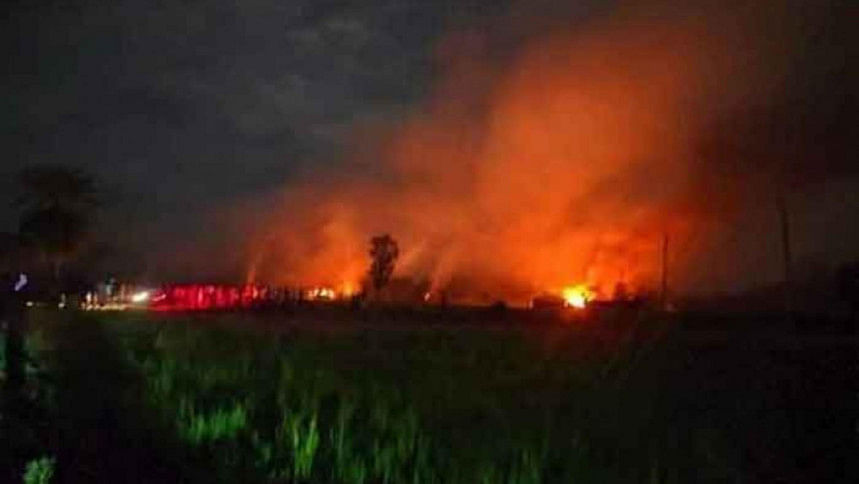Communal Attacks: Law enforcers cannot avoid responsibilities

Forty-seven eminent citizens yesterday said the recurrence of communal attacks in the country was due to a prevailing culture of impunity.
Although many communal attacks of similar nature took place in the past, those involved in the incidents remained out of the trial process, the eminent citizens said in a joint statement.
"We strongly demand that individuals and groups, those involved in such criminal acts and [who] created religious madness in the past few days, be immediately brought under the trial process," reads the statement.
Simultaneously, the citizens called upon the government to immediately undertake a realistic initiative to uphold religious harmony and ensure equal rights of all citizens as well as by uniting all the good forces in the society.
They expressed anger and strongly condemned the recent "disgusting" attacks and vandalism of the pavilions and houses of the Hindu community.
They said those who were involved in the incidents, directly or indirectly, were against establishing equal rights of all citizens and an ominous threat to the country's independence and sovereignty.
The citizens also called upon the government to immediately identify the perpetrators and ensure proper punishment through trial.
Besides, they urged the government to provide the necessary compensation to the victims.
They said the administration and law enforcement agencies should have played a more "cautious, proactive and responsible" role after the Cumilla incident.
However, after that incident, more such communal attacks took place in other parts of the country. The administration and law enforcement agencies cannot avoid their responsibilities in this regard, they added.
The reasons behind the inactive role of the administration and law enforcement agencies regarding the incidents have to be found out, they further said.
On the other hand, in some places, law enforcement agencies opened fire on people's gatherings to disperse them. It should be investigated whether law enforcement agencies' such act was as per the law, said the citizens.
The citizens said after the incidents in different parts of the country, it was seen that the country's main political parties got involved in their old habit of blaming each other instead of unitedly preventing the incidents' recurrence.
In other words, such evidence-less politics of blaming help the perpetrators to be in hiding and remain unpunished, they said.
"We urge the politicians to keep themselves away from such irresponsible acts," reads the joint statement.
Besides, they urged law enforcement agencies to restrain from grossly filing cases, to not harass people in the name of justice and to not get involved in the "arrest business".
The signatories are: Prof Emeritus Serajul Islam Choudhury; Jurist Barrister M Amir-Ul Islam; former advisers to the caretaker government M Hafizuddin Khan, Akbar Ali Khan, Sultana Kamal, Hameeda Hossain, and Rasheda K Chowdhury; former justice Abdul Matin; former Election Commissioner Brig Gen (retd) M Sakhawat Hussain; former Bangladesh Bank governor Salehuddin Ahmed; former cabinet secretary Ali Imam Majumder; former LGRD secretary Abu Alam Md Shahid Khan; former foreign secretary Mohiuddin Ahmed; CPD distinguished fellow Dr Debapriya Bhattacharya; rights activists Khushi Kabir, Barrister Sara Hossain, Faustina Pereira, and Nur Khan; Central Women's University VC Prof Perween Hasan; Shushashoner Jonno Nagorik Secretary Badiul Alam Majumdar; Prof Anu Muhammad; local government expert Prof Tofail Ahmed; former ambassador Tariq A Karim; jurist Dr Shahdeen Malik, Naripokkho member Shireen Huq; Bangladesh National Women Lawyers Association President Salma Ali; Manusher Jonno Foundation Executive Director Shaheen Anam; ActionAid Bangladesh Country Director Farah Kabir; Prof Geeti Ara Nasreen; Bangladesh Adibashi Forum General Secretary Sanjeeb Drong; Photographer Shahidul Alam; Brotee CEO Sharmeen Murshid; Bangladesh Environmental Lawyers Association Executive Director Syeda Rizwana Hasan; Prof Asif Nazrul, Prof Rahnuma Ahmed, Prof Akmal Hossain, Prof Shapan Adnan, Prof Firdaus Azim, Prof Robaet Ferdous, Prof Niaz Asadullah, Associate Prof Nova Ahmed; former banker Syed Abu Naser Bukhtear Ahmed; South Asian Network on Economic Modelling Executive Director Prof Selim Raihan; Ain O Salish Kendra Executive Director Golam Monowar Kamal; Bangladesh Protibondhi Foundation's Clinical Neurosciences Centre Director Prof Naila Zaman Khan; Nagorik Udyog Chief Executive Zakir Hossain; and Article 19 Regional Director Faruq Faisel.

 For all latest news, follow The Daily Star's Google News channel.
For all latest news, follow The Daily Star's Google News channel. 



Comments